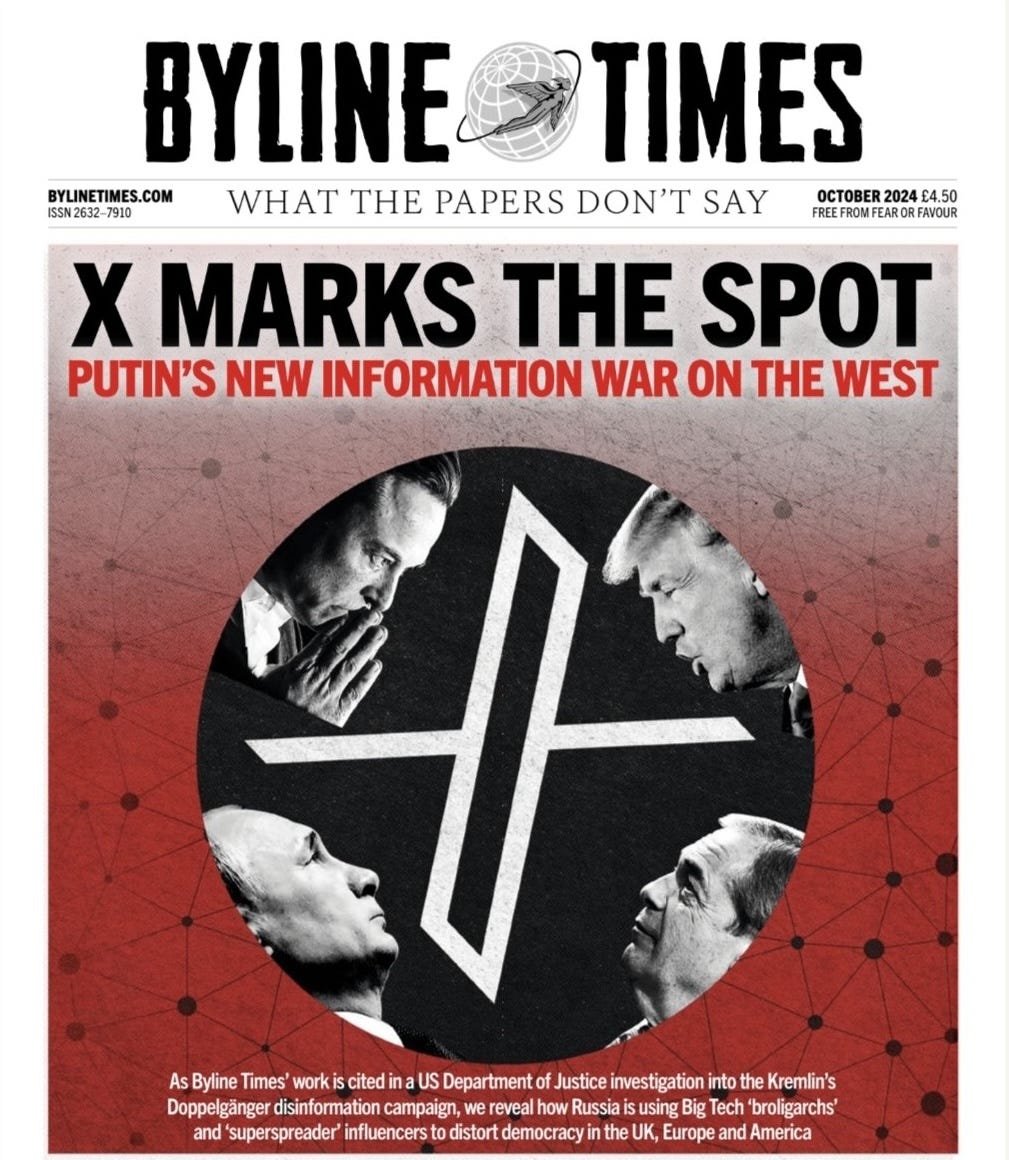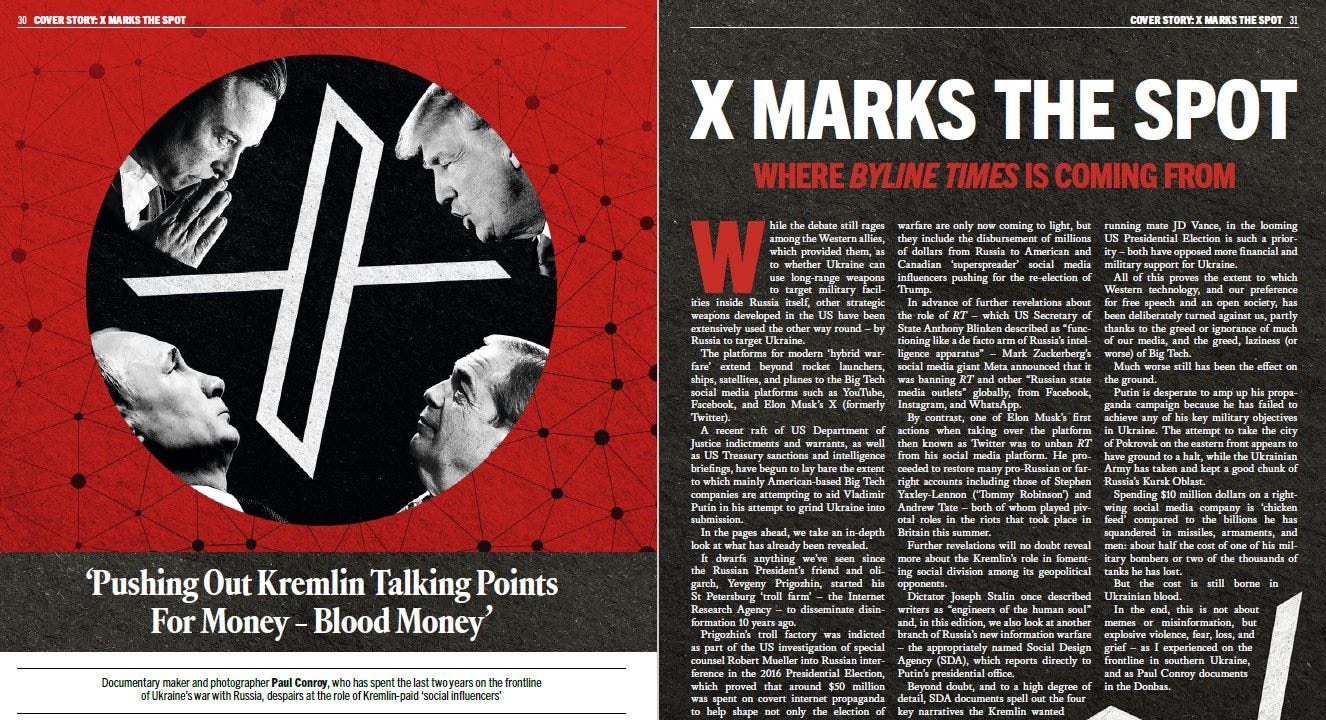X Marks the Spot
In an exclusive preview from the new print edition, Adam Bienkov reports on how Big Tech barons allowed old media to take back control
The following is taken from the October edition of Byline Times, which will be hitting doorsteps and shops next week. Please subscribe to be among the first to get your copy here.
History is normally depicted as a straight line. From primitive man to the information age, we look back on our past as being a long march from ignorance to knowledge, from darkness to light. But, despite our love of such simple stories, real history is always far more complicated. In every era there are backwards steps as well as forward ones, with not just a single uninterrupted line of progress, but many intersecting ones. Like coordinates on a map, it is only where these competing lines meet that we can truly get our bearings. The truth often lies somewhere in the middle. X marks the spot.
This can be seen most clearly in the history of social media.
Emerging properly in the early years of the 21st Century, the new social media platforms were originally sold to the world as being a utopian vision of connection and empowerment. Unlike the oligarchic nature of old media – in which a small number of powerful men decided on what was ‘reality’ – these new platforms promised to fully democratise and globalise the sharing of information.
In the early years, that is exactly what appeared to happen.
For the first time, media organisations were forced to peer ‘below the line’ at those responding to the stories they were telling, while many of those previously held below that line were able to cross over fully to the other side.
But, as time went on, old forms of power reasserted themselves.
Platforms which had been sold as being open and democratic digital ‘town squares’ became increasingly controlled by the personal and financial needs of the unimaginably wealthy men who owned them. Social media bosses and their algorithms bent not to truth, but to power and to money.
On no other platform is this more apparent than on X – the social media platform formerly known as Twitter.
More than any other, it had originally embodied the early promise of social media. From the Arab Spring uprisings, to the phone-hacking trial, the power of ‘live tweeting’ brought an immediacy and radical urgency to social media that had been absent from the media of old.
But, before long, the old dogs learned new tricks.
Big media organisations began to incorporate and master the very platform that had promised to replace them, while the politicians and public figures which the likes of X had promised to help hold to account, quickly began to hold court themselves.
The platform of grassroots politics became the platform of Donald Trump and Elon Musk. Far from offering truth to power, X has come to offer the powerful the ability to shape and promote their own truth.
Meanwhile, the old forms of media – which sites like X had originally aimed to usurp – remained stubbornly in place. Established newspapers, the death of which had been repeatedly and wrongly prophesied, continued to assert their influence and power.
Nowhere has this been more obvious than in the UK, where the Westminster ‘lobby system’ of political reporting is still dominated by a small number of publications which were previously based in London’s Fleet Street.
Under this system, which was originally set up as a way for governments to secretly brief British newspapers, accredited journalists embed themselves in the machinery of Parliament and government in exchange for access to those in power.
Much has changed outside Parliament’s boundaries since ‘the lobby’ was first formalised as an institution, yet inside its walls things have mostly stayed the same. Government briefings remain off-camera and unpublished, with ‘live tweeting’ of the sessions strictly forbidden. And while those working inside Westminster may obsess over social media more than anyone, the greatest access and patronage is still reserved for those predominantly plying their wares in old media.
Even under a new, and supposedly progressive, Labour Government, Downing Street officials still decide in advance which of these legacy organisations will be allowed to ask questions at prime ministerial press conferences – with insurgent publications like this newspaper firmly excluded.
So, while the commercial viability of such old media outlets continues to decline, their attraction as agents of influence only appears to increase. Whether it be by Saudi conglomerates or right-wing hedge fund managers, the ownership of old media remains an attractive prospect in this new digital era.
Among this new band of media barons, GB News owner Sir Paul Marshall stands out as the quintessential example. A former Liberal Democrat donor, he left the party over the EU Referendum, before seemingly becoming radicalised by the new era of online ‘culture wars’ that followed.
While his creation of the UK’s own version of Fox News may have been a commercial failure, it has been a political masterstroke. Since its inception, the channel – which practises exactly the sort of radical and extreme right-wing politics now dominating Elon Musk’s X – has come to dominate the shape of the formerly governing party in a way that few could have imagined.
With his upcoming purchase of the Conservative Party’s house journal, the Spectator magazine, he now promises to secure his position at the zenith of modern right-wing politics in the UK.
Far from allowing the masses to speak new truth to old power, the era of social media has simply helped old power further its reach.
So, as we enter a new era dominated by artificial and generative intelligence, we should be mindful of the utopian and democratic visions their creators’ promise. Just as social media offered so much, before ultimately delivering so little, the new digital era risks doing exactly the same.
For every step forward these new platforms and technologies may promise, there is the risk that we all end up taking several steps back.





Does it matter that much? I’m not convinced. It is clear to me that the old media lobby is deeply ineffective at holding government to account so does it really matter is the usual suspects are the ones in pole position at the No.10 feeding trough?